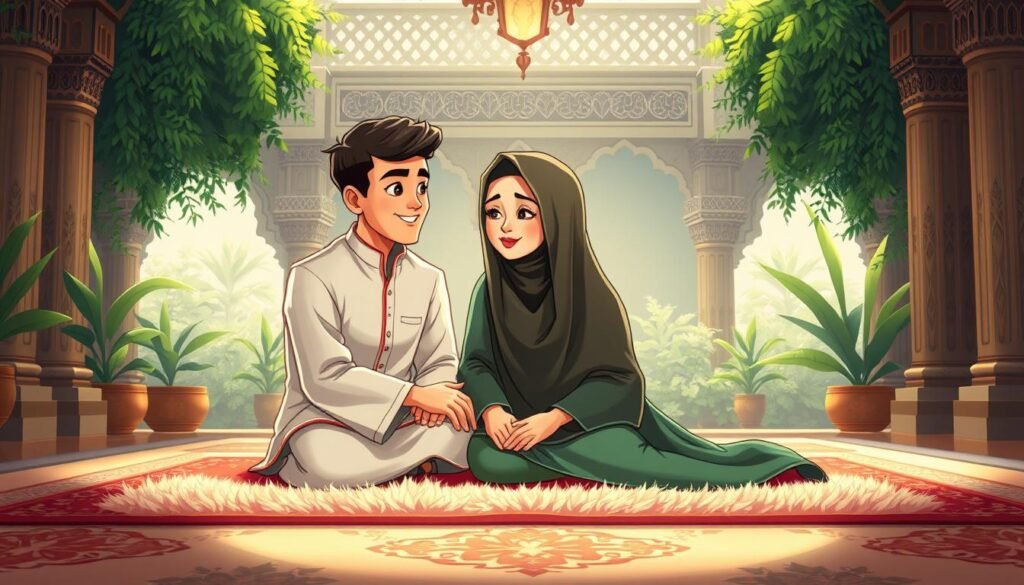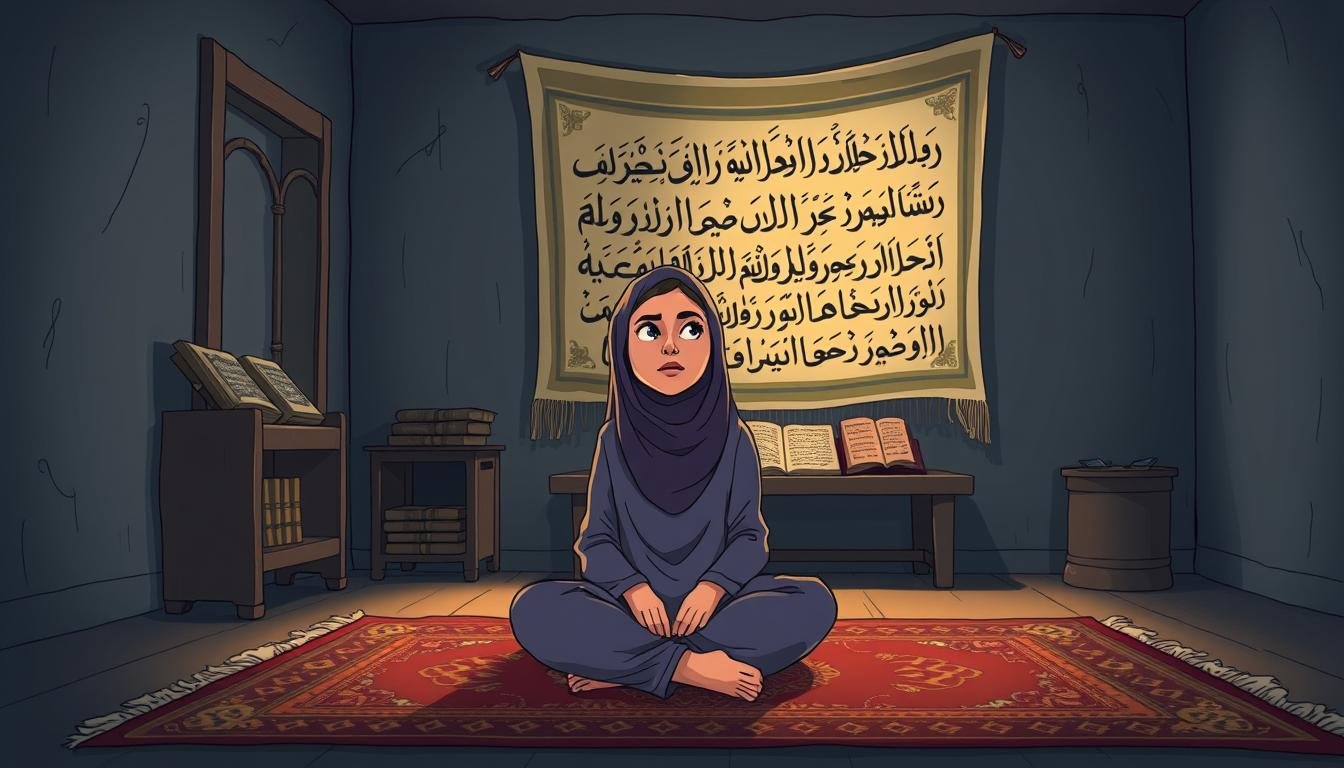Thinking about Islamic marriage makes me remember a key Hadith about wives. It has been talked about for 18 years, starting in 2000-2001. This Hadith is real and comes from three books: Sunan Al-Nisai, Abu Dawood, and Ibn Majah.
It tells the story of Barirah, a slave girl freed by Aishah, the Prophet’s wife. Her husband, Mughith, followed her, crying because he loved her so much. The Prophet helped Mughith, showing how important love and feelings are in marriage.
This Hadith is very important. It talks about how feelings and rights matter in marriage. It shows that a wife’s unhappiness can lead to divorce, even if the husband loves her and they have kids together. It teaches us to understand the Hadith about wife and its role in marriage.
The Power of Prophetic Guidance in Marriage
Understanding the role of Hadith in daily life is key. For a Muslim wife, the Prophet Muhammad’s teachings are a foundation. His life shows how to build strong, healthy Islamic relationships.
The Prophet was married to 13 wives, with 9 surviving him. This shows his ability to keep harmony in his home. His marriages were strategic to strengthen alliances and unity in the early Islamic community.
Studying the Prophet’s approach to marriage helps us understand our own relationships. We learn about compassion, respect, and mutual support. This is important for building strong, fulfilling marriages based on Islamic principles.
The Prophet’s example is a powerful guide for building strong marriages. He balanced his wives’ needs while being fair and just. His life teaches us about empathy, communication, and trust in marriage.
The Profound Hadith About Wife and Its Authentication
Exploring the Hadith about wife and its authentication is key. It shows the Hadith about marriage is vital in Islamic studies. The Quran tells husbands to be kind, fair, and respectful to their wives. This stresses the need for mutual respect and teamwork in Islamic marriage.
In Islam, a husband and wife are partners with equal rights and duties. This idea is backed by Islamic teachings. It promotes respect and teamwork between spouses, leading to a peaceful home life. Looking into the Hadith about marriage helps us understand the wife’s role in Islamic marriage and the need for accurate Hadith verification.
In Islamic studies, checking Hadith accuracy is very important. By studying the Hadith about marriage, we learn more about Islamic marriage and the wife’s place in society. Islam teaches respect, teamwork, and equality between spouses. This creates a peaceful and harmonious family environment.
Historical Context Behind This Revelation
Exploring the Hadith about women, we see the Prophet’s time was key. The Quran’s teachings on modesty and faith were important. Muhammad’s marriages, like his to Zaynab bint Jahsh, were often questioned.
His wives felt jealous, like when he was with Mariyah on Hafsah’s day. This shows the complex Islamic relationships back then. Understanding the historical context helps us see the Hadith’s meaning.
Social Conditions During Prophet’s Time
The Prophet’s time was a mix of tribal ways and new Islamic ideas. Muhammad’s marriages, like to Sauda bint Zam’ah, show the diverse society. The Quran’s teachings on marriage aimed to balance personal rights and social duties.
The Events Leading to This Teaching
The events leading to the Hadith about women were shaped by the time’s culture. Quran verses, like Surah 33:37, tell us about Muhammad’s marriage to Zaynab bint Jahsh. Looking at these events helps us understand the Hadith’s importance in Islamic relationships.
Breaking Down the Meaning Word by Word
Exploring Islamic marriage shows us the key role of a wife in Islam. The Holy Qur’an says marriage is a bond between a man and woman, with rights and duties. In Islam, the wife is a partner and friend, with duties as important as the husband’s.
The wife is seen as a protective layer for her husband, showing their mutual support. The Prophet Muhammad (peace be upon him) said the best man is the one who treats his family well. The wife’s rights include dowry, support, kindness, privacy, and learning about her faith.
The husband must give his wife what she needs and treat her with kindness. The Quran says men support women financially and have certain rights. But this doesn’t mean the wife is less than the husband. It’s about respect and working together.
In summary, Islamic marriage and the wife’s role are based on the Quran and the Prophet Muhammad (peace be upon him). Understanding these teachings helps us build strong, respectful relationships.
The Revolutionary Message for Modern Marriages
The Hadith about marriage shows us that Islamic relationships are based on love and mercy. The Holy Prophet (sa) taught us to treat our spouses with kindness. He said a believing man should never hate his wife.
This message can change how we see our relationships. It helps us build a strong emotional and spiritual bond with our partners.
In today’s marriages, the Hadith offers a new way of thinking. It teaches couples to understand and value each other more. Islam sees the family as the core of society. Marriages are built on love, togetherness, and mercy.
Following the Hadith’s teachings can make our marriages stronger and more loving. The Holy Prophet (sa) said spouses should make decisions together. This promotes respect and understanding.
As we aim for harmony and love in our marriages, the Hadith guides us. It brings a fresh message for today’s couples.
Common Misinterpretations to Avoid
Exploring Islamic marriage, we find common misunderstandings. Some people get the role of a wife in Islam wrong. For example, the rule about a wife needing her husband’s okay to leave the house is often misread.
This rule, from a Hadith by Ibn ‘Umar, doesn’t mean a wife is stuck at home. It highlights the need for respect and talking in a marriage.
Another big mistake is thinking a husband can always use physical punishment. The Qur’an talks about this (4:34), but it’s only for extreme cases. Most Islamic scholars agree that respect and responsibility come first, not punishment.

It’s also wrong to think only men can start a divorce. The Qur’an says both men and women can divorce, but only once. There’s a waiting period, like three months for pregnant women.
By understanding these points, we can see Islamic marriage and a wife’s role more clearly. This helps us avoid common mistakes.
Practical Ways to Implement This Hadith
Exploring the Hadith about women in our daily lives is key. It shows the importance of Islamic relationships in creating a loving space. By following the Prophet Muhammad’s teachings, we learn more about our roles in relationships.
One great way to apply this Hadith is through daily actions. Saying “I love you” every day can make marriages happier. Giving gifts or calling to show love also makes a big difference in a wife’s joy.
The Hadith about women also talks about being kind and gentle. These values help keep relationships strong. Remembering the Prophet Muhammad’s love for his wives teaches us about effective communication in marriage.
Scientific Research Supporting This Ancient Wisdom
Exploring Islamic marriage shows how science backs the Prophet Muhammad (PBUH). He said to look for certain qualities in a wife in Islam. Research agrees, saying shared values are key in a good marriage.
Studies find that couples with the same beliefs are stronger. This matches the Prophet’s advice on choosing a spouse with strong faith. Kindness, affection, and respect are also vital, as Islam teaches.
Research also links a happy marriage to better health. This supports Islam’s view of marriage as a source of joy. Seeing the Prophet’s wisdom through science shows his teachings are wise and backed by evidence.
Real Stories from Wives Who Applied This Teaching
Thinking about the Hadith about marriage reminds me of kindness and compassion in Islamic relationships. Many wives have shared how this teaching changed their marriages and lives.
One wife said she became more patient and understanding after learning about the Hadith about marriage. She noticed a big change in their relationship and felt closer to her husband. This shows how Islamic relationships can bring harmony and love.

Another wife was inspired by a quote from the Prophet Muhammad. It said, “The best of you are those who are the best in character.” This quote made her want to improve her character and be a better partner. Her story shows how the Hadith about marriage can help us grow and improve our relationships.
These stories show how the Hadith about marriage can change real lives and relationships. By following Islam and being kind, compassionate, and empathetic, we can create stronger, more loving Islamic relationships. These relationships can bring joy and fulfillment to our lives.
Challenges in Modern Application
Exploring Islamic marriage and the wife’s role in Islam shows us challenges today. Couples face many obstacles, like cultural and societal pressures. These can affect their relationship a lot.
A study found that about 70% of couples have big conflicts. They disagree on things like intimacy, money, and who does what at home.
Good communication is key to a healthy relationship. Couples who talk well during fights are 10 times more likely to stay together. But, child marriage and domestic violence are big problems in some Muslim communities.
It’s important to help couples deal with these issues. A study on marital challenges and Islamic solutions shows the need for mediation. It also points to the Qur’an and Sunnah for fixing marital problems.
In an Islamic marriage, the wife has a big role in keeping peace. Understanding and helping couples can make relationships stronger. We need to bridge cultural gaps and offer Islamic solutions for today’s relationship challenges.
Connecting Heart and Faith: Steps Forward
As we wrap up our look at the Hadith about a wife’s rights, it’s clear. Applying its wisdom can change our marriages and deepen our faith. The Hadith teaches us to care for each other, respect each other, and grow spiritually. It’s a timeless guide for Islamic relationships that we should follow.
Personal Development Goals
To really use this Hadith, we need to start a journey of personal growth. We should work on knowing ourselves better, being emotionally smart, and checking our heart’s state often. By living in line with our faith, we grow spiritually. This helps us build strong, loving relationships.
Islamic relationships
Spiritual Growth Opportunities
Personal growth is important, but so is our spiritual journey. Remembering Allah every day through the Quran, dhikr, and prayer feeds our souls. Being around people who believe and support each other is also key.
Hadith about women
It helps us grow closer to our spouses and to Allah.
FAQ
What does the Hadith say about the role of a wife in Islam, and how can it impact our understanding of Islamic marriage?
Why is this particular Hadith about wife significant, and how does it stand out from other teachings?
How is the authentication of this Hadith important, and what does it mean for our understanding of Islamic teachings?
What is the historical context behind this Hadith, and how does it impact our understanding of its meaning?
How can we break down the meaning of this Hadith word by word, and what insights can we gain from this analysis?
What is the revolutionary message of this Hadith for modern marriages, and how can it transform relationship dynamics?
What are the common misinterpretations of this Hadith, and why is it important to avoid them?
How can we implement the Hadith about wife in our daily lives, and what are the possible benefits?
What scientific research supports the wisdom of this Hadith, and how can we combine Islamic teachings with scientific findings?
What real-life stories and testimonials can we learn from wives who have applied this Hadith in their lives?
What are the challenges in the modern application of this Hadith, and how can we overcome them?
What steps can we take to connect our hearts and faith, and how can this enhance our understanding and application of the Hadith?

Embracing Faith, One Insight at a Time!
The teachings of the Quran have always guided my path. With a deep passion for Islamic knowledge, I strive to blend the wisdom of tradition with the relevance of today, making the timeless messages of Islam accessible and meaningful for everyone.
Muslim Culture Hub is my platform to share historical insights and thought-provoking articles, exploring both well-known and lesser-discussed aspects of Islamic culture and beliefs. My mission is to create an inclusive online space where everyone can learn, strengthen their faith, and connect with the profound message of Islam.
Join the journey!
May peace be upon you.








